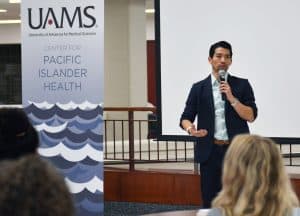July 18, 2017 | More than 50 Marshallese high school students and parents attended the Pathways to Health Professions conference June 9-10 in Springdale, where they were encouraged to pursue higher education and health care careers.
Sheldon Riklon, M.D., an associate professor in the UAMS College of Medicine, shared the story of his perseverance and efforts as one of only two Marshallese physicians to have graduated from U.S. medical schools.
“When I got to college, it was very difficult. I didn’t know anybody. Everyone spoke English. I had no chemistry, no physics, and only one year of biology,” said Riklon. “It took me six years in college to graduate because my first year I took all introductory courses to get to the same level everyone else was.”
Hosted by the UAMS Center for Pacific Islander Health, the UAMS Center for Diversity Affairs, and the Arkansas Coalition of Marshallese, the conference helps students and parents understand the college application process, options for higher education and job opportunities in health care. According to the Association of American Medical Colleges, less than 1 percent of medical school graduates in 2015 identified as Native Hawaiian or Pacific Islander.
For many of the parents, it is the first time to learn about programs and financing options to help their child into and through higher education.

“The participation of the parents shows us they are very supportive of their children’s education,” said Melisa Laelan, commissioner of the Arkansas Minority Health Commission. “They learned that there are ways their children can apply for scholarships. They learned about programs that are available like our Child Savings Account program spearheaded by the Arkansas Coalition of Marshallese.”
Laelan said parental support is needed to help students hurdle the challenge of getting into college and completing a bachelor’s degree before medical school is possible. “Most important is that parents learned it really takes a great deal of effort from them to encourage and nurture a student to reach his or her dreams.”
Kimberlyn Blann, director of outreach for the Center for Diversity Affairs, explained UAMS is able to help students figure out what kind of health career would be the best fit. Every summer, the center provides the Academy of Pre-Health Scholars, a free multi-week Little Rock-based program for high school students. Participants receive help preparing for the ACT and learn which classes to take in high school to succeed in college. They also gain valuable information about allied health professions and ways to build careers in health care without spending years in medical school.
“It’s not just doctors. It’s so much more than just doctors. With the allied health professions, you can become a respiratory therapist, a physician assistant, or an emergency medical technician. You can become an EMT with just a high school diploma,” Blann said.
Nia Aitaoto, Ph.D., co-director of the Center for Pacific Islander Health, echoed that sentiment in her presentation.
“We want more doctors, more nurses, more people in public health, more researchers. We want more people like us in the workforce,” said Aitaoto. “It’s easier to teach you to become health care providers than it is for us to teach all of the doctors and nurses and therapists about our culture and our language.”
Pearl McElfish, Ph.D., associate vice chancellor of UAMS Northwest Regional Campus, said, “Pathways is important to help nurture and develop that next generation of health care leaders that will be able to provide truly community-based care.”
Participants also questioned other Pacific Islanders working as doctors, nurses, and in allied health professions, as well as current Marshallese college students.
Speakers stressed the importance of preparing as much as possible in high school and taking advantage of available resources. They recommended those interested in pursuing a health care career take Advanced Placement classes to earn college credit while still in high school as well as higher level science and math classes. They emphasized the role of guidance counselors in selecting the right classes to take in high school and guiding them through scholarship and loan applications.
Andy Subica, Ph.D., a psychologist and researcher at the University of California Riverside School of Medicine, had an experience similar to Riklon’s.

“Everyone here is going to tell you that they struggled at some point, whether it’s in high school or college,” Subica said, “But you’ve got to keep working and remember that you belong. You belong there even if you might be the only Marshallese person in there. So don’t get discouraged.”
Educational attainment statistics for the Mashallese and Pacific Islanders are difficult to find because they are often aggregated with a larger Asian-American ethnicity. Some studies indicate less than 20 percent of Native Hawaiians and other Pacific Islanders have a bachelor’s degree, and it is not uncommon to not have a high school diploma. The annual Pathways conference shows examples of community members who persisted and worked hard to achieve their careers.
“Any journey starts with a canoe. We’re here to help you get in the canoe,” said Aitaoto. “That big blue ocean . . . It’s not what separates us. It’s what connects us. It’s our network. We need to be proud of that.”
